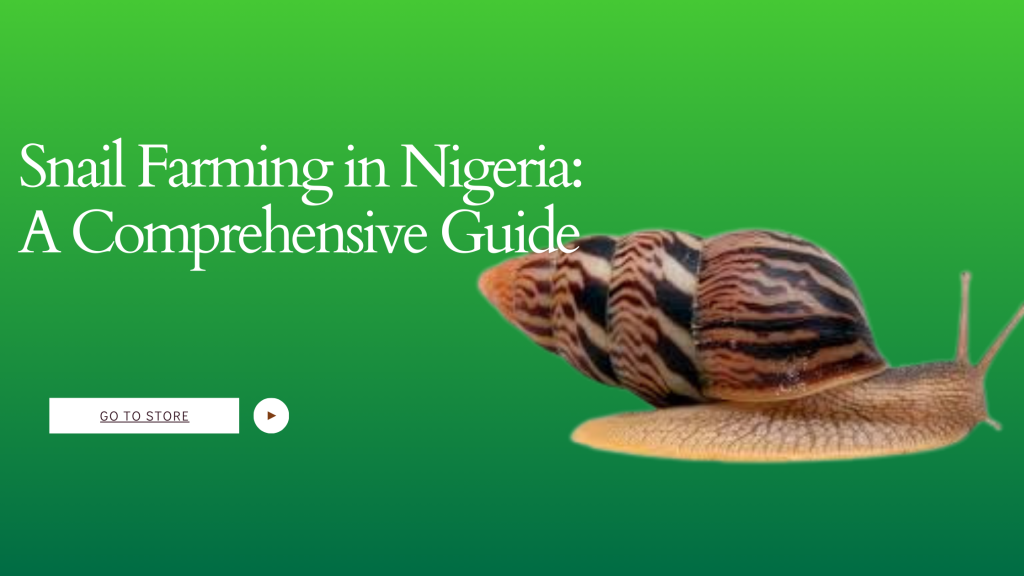Snail Farming in Nigeria: A Comprehensive Guide

Snail Farming in Nigeria: A Comprehensive Guide
Snail farming, also known as heliciculture, is gaining traction in Nigeria due to its profitability and sustainable nature. With minimal investment and high demand for snails as a delicacy, many Nigerians are venturing into this lucrative agricultural business. This blog provides a detailed guide on how to start snail farming in Nigeria, covering essential topics such as training programs, equipment suppliers, profitability, feeding techniques, challenges, and the best snail species for farming.
How to Start Snail Farming in Nigeria
Starting a snail farms in Nigeria is straightforward if you follow these steps:
- Conduct Research: Learn about snail farming techniques and market trends.
- Choose the Right Snail Species: Focus on species with high market value (discussed below).
- Select a Suitable Location: Opt for a humid environment with adequate shade.
- Build Housing Structures: Create pens using materials like wooden boxes or concrete pens.
- Purchase Healthy Snails: Source quality snails from reliable suppliers or breeders.
- Feed Your Snails: Provide a balanced diet of leaves, fruits, and commercial feeds.
- Maintain Hygiene: Ensure the snail habitat is clean to prevent diseases.
- Market Your Snails: Develop a strategy to sell your snails to local and international markets.
Snail Farming Training Programs in Nigeria
For beginners, enrolling in snail farming training programs can be invaluable. These programs provide hands-on experience and cover key aspects such as:
- Breeding techniques
- Disease prevention and control
- Marketing strategies
Where to Find Training Programs
- Agricultural Extension Offices: Often offer free or subsidized training.
- Private Institutes: Specialized training centers focusing on snail farming.
- Online Courses: Platforms like Udemy and Coursera provide flexible learning options.
Snail Farming Equipment Suppliers in Nigeria
Having the right equipment is essential for efficient snail farming. Some commonly needed tools include:
- Snail Housing Materials: Wooden boxes, netting, and concrete pens.
- Feeding Trays: For organized feeding.
- Water Sprinklers: To maintain humidity levels.
- Egg Incubators: For breeding purposes.
Top Equipment Suppliers in Nigeria
- Farmpays: Offers a wide range of agricultural supplies.
- Local Markets: Affordable options for small-scale farmers.
Snail Farming Profitability in Nigeria
Snail farming is highly profitable due to its low startup costs and high market demand. Key profitability factors include:
- Low Operating Costs: Snails require minimal feeding and maintenance.
- High Market Prices: Snails sell for NGN 500–NGN 1,500 each, depending on size and species.
- Export Opportunities: Snail meat is in demand internationally, especially in Europe and Asia.
Case Study: A farmer in Ogun State started with 200 snails and earned over NGN 1,000,000 in a year.
Snail Farming Market in Nigeria
The snail farming market in Nigeria is expanding, driven by:
- Local Consumption: Snails are a popular delicacy in Nigerian cuisine.
- Export Potential: Demand for snail meat and slime in the cosmetic and pharmaceutical industries.
- Growing Awareness: Increased interest in sustainable farming practices.
Marketing Tips
- Target Local Restaurants and Hotels: Many buy snails in bulk.
- Sell at Farmers’ Markets: Directly reach consumers.
- Leverage Online Platforms: Use social media and e-commerce sites to market your products.
Snail Farming Feeding Techniques in Nigeria
Proper feeding is crucial for healthy and fast-growing snails. Consider the following:
- Natural Foods: Leaves (pawpaw, cassava), fruits (banana, watermelon), and vegetables.
- Commercial Feeds: Supplements to boost growth.
- Calcium Sources: Eggshells and limestone for strong shells.
- Feeding Schedule: Feed snails in the evening when they are most active.
Snail Farming Challenges and Solutions in Nigeria
While profitable, snail farming comes with challenges:
Common Challenges
- Pests and Predators: Ants, rats, and birds can harm snails.
- Diseases: Poor hygiene can lead to fungal and bacterial infections.
- Weather Conditions: Extreme heat or dryness affects snail health.
- Market Access: Difficulty in finding buyers.
Solutions
- Secure Housing: Use predator-proof enclosures.
- Maintain Clean Habitats: Regular cleaning reduces disease risks.
- Irrigation: Use sprinklers to maintain optimal humidity.
- Build Networks: Join snail farming cooperatives to access markets.
Best Snail Species for Farming in Nigeria
Choosing the right snail species is key to success. Popular options include:
- Achatina Achatina (Giant African Land Snail)
- Large size and high reproduction rate.
- Achatina Fulica
- Adaptable to various climates.
- Archachatina Marginata
- Preferred for its meat quality and size.
FAQ on Snail Farming in Nigeria
Q1: Is snail farming profitable in Nigeria?
A: Yes, with proper management, snail farming can yield high returns on investment.
Q2: How much does it cost to start a snail farm?
A: You can start small with NGN 50,000 to NGN 100,000, depending on the scale.
Q3: What do snails eat?
A: Snails feed on leaves, fruits, vegetables, and commercial feeds.
Q4: Where can I sell my snails?
A: Local markets, restaurants, hotels, and online platforms are great options.
Conclusion
Snail farming in Nigeria is a lucrative and sustainable venture for anyone willing to invest time and resources. You can overcome challenges and reap significant rewards with proper training, equipment, and strategies. Start your snail farming journey today and tap into the growing market!
click this link to watch the video Snail Farming in Nigeria: A Comprehensive Guide


Add comment
You must be logged in to post a comment.